Racism, Health Disparities, and Aboriginal Australians: An Essay
VerifiedAdded on 2022/09/13
|6
|1240
|11
Essay
AI Summary
This sociology essay examines racism as a significant social determinant of health for Aboriginal and Torres Strait Islander peoples in Australia. It argues that racism leads to unfair distribution of opportunities and wealth, contributing to health disparities. The essay discusses the impact of racism, the historical and contemporary challenges faced by Indigenous Australians, and the role of leaders like Joyce Clague in advocating for Indigenous rights and fighting against discrimination. Furthermore, it highlights the crucial role of registered nurses in addressing healthcare inequalities by providing culturally safe care, implementing upstream strategies, and promoting education to combat prejudice and improve the health outcomes of Aboriginal communities. The conclusion emphasizes the importance of equity in healthcare and the need for appropriate nursing interventions to support disadvantaged Indigenous Australians.
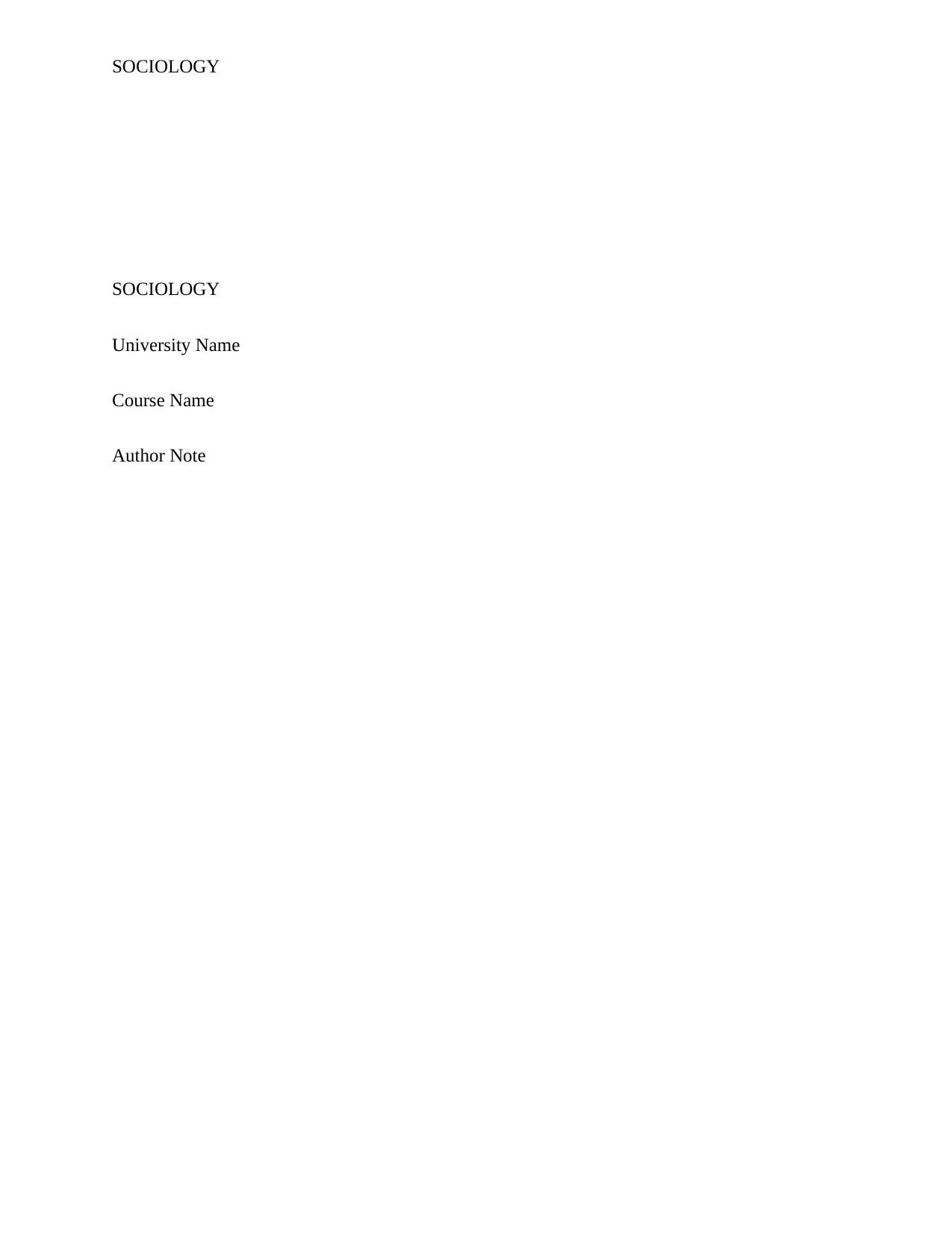
SOCIOLOGY
SOCIOLOGY
University Name
Course Name
Author Note
SOCIOLOGY
University Name
Course Name
Author Note
Paraphrase This Document
Need a fresh take? Get an instant paraphrase of this document with our AI Paraphraser
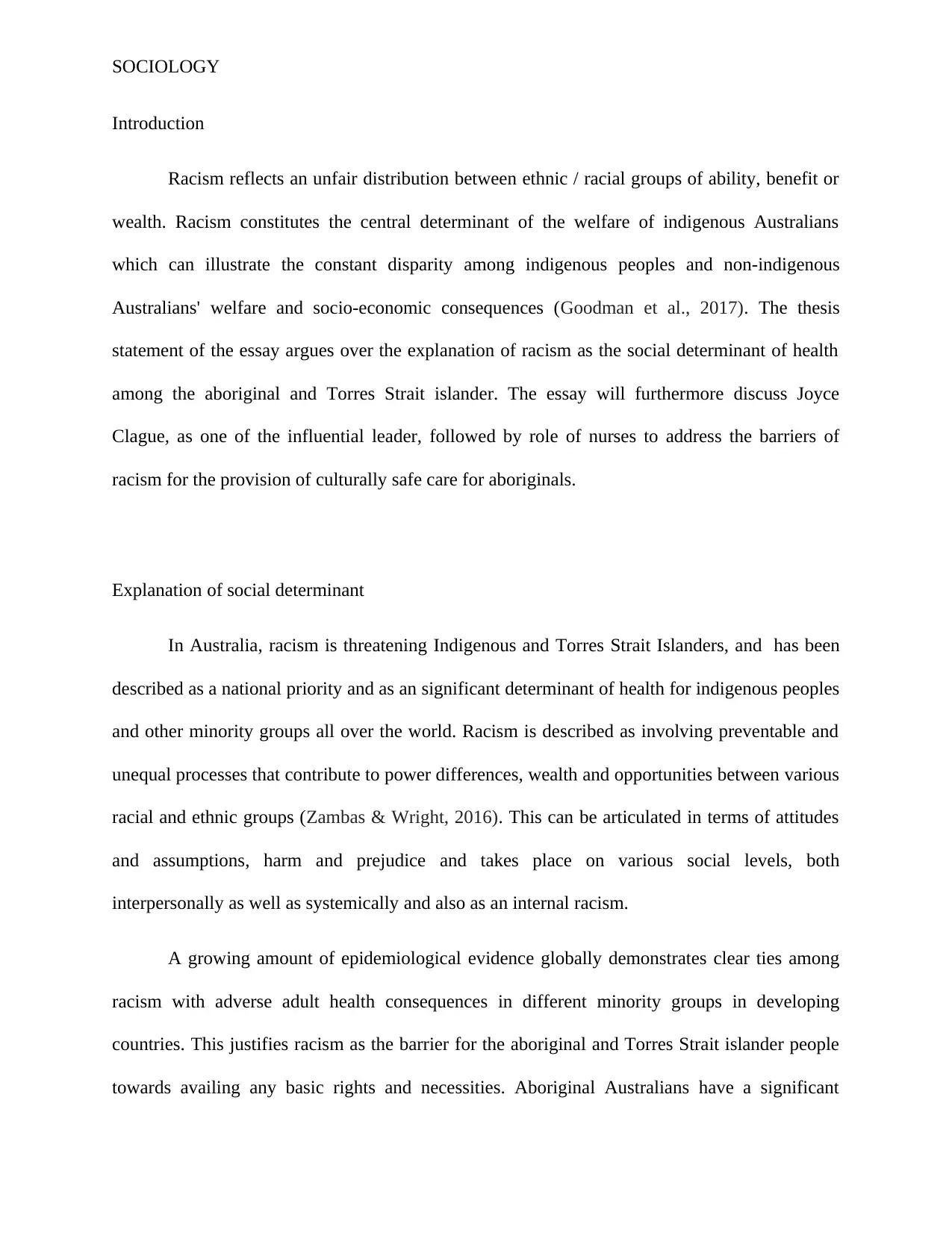
SOCIOLOGY
Introduction
Racism reflects an unfair distribution between ethnic / racial groups of ability, benefit or
wealth. Racism constitutes the central determinant of the welfare of indigenous Australians
which can illustrate the constant disparity among indigenous peoples and non-indigenous
Australians' welfare and socio-economic consequences (Goodman et al., 2017). The thesis
statement of the essay argues over the explanation of racism as the social determinant of health
among the aboriginal and Torres Strait islander. The essay will furthermore discuss Joyce
Clague, as one of the influential leader, followed by role of nurses to address the barriers of
racism for the provision of culturally safe care for aboriginals.
Explanation of social determinant
In Australia, racism is threatening Indigenous and Torres Strait Islanders, and has been
described as a national priority and as an significant determinant of health for indigenous peoples
and other minority groups all over the world. Racism is described as involving preventable and
unequal processes that contribute to power differences, wealth and opportunities between various
racial and ethnic groups (Zambas & Wright, 2016). This can be articulated in terms of attitudes
and assumptions, harm and prejudice and takes place on various social levels, both
interpersonally as well as systemically and also as an internal racism.
A growing amount of epidemiological evidence globally demonstrates clear ties among
racism with adverse adult health consequences in different minority groups in developing
countries. This justifies racism as the barrier for the aboriginal and Torres Strait islander people
towards availing any basic rights and necessities. Aboriginal Australians have a significant
Introduction
Racism reflects an unfair distribution between ethnic / racial groups of ability, benefit or
wealth. Racism constitutes the central determinant of the welfare of indigenous Australians
which can illustrate the constant disparity among indigenous peoples and non-indigenous
Australians' welfare and socio-economic consequences (Goodman et al., 2017). The thesis
statement of the essay argues over the explanation of racism as the social determinant of health
among the aboriginal and Torres Strait islander. The essay will furthermore discuss Joyce
Clague, as one of the influential leader, followed by role of nurses to address the barriers of
racism for the provision of culturally safe care for aboriginals.
Explanation of social determinant
In Australia, racism is threatening Indigenous and Torres Strait Islanders, and has been
described as a national priority and as an significant determinant of health for indigenous peoples
and other minority groups all over the world. Racism is described as involving preventable and
unequal processes that contribute to power differences, wealth and opportunities between various
racial and ethnic groups (Zambas & Wright, 2016). This can be articulated in terms of attitudes
and assumptions, harm and prejudice and takes place on various social levels, both
interpersonally as well as systemically and also as an internal racism.
A growing amount of epidemiological evidence globally demonstrates clear ties among
racism with adverse adult health consequences in different minority groups in developing
countries. This justifies racism as the barrier for the aboriginal and Torres Strait islander people
towards availing any basic rights and necessities. Aboriginal Australians have a significant
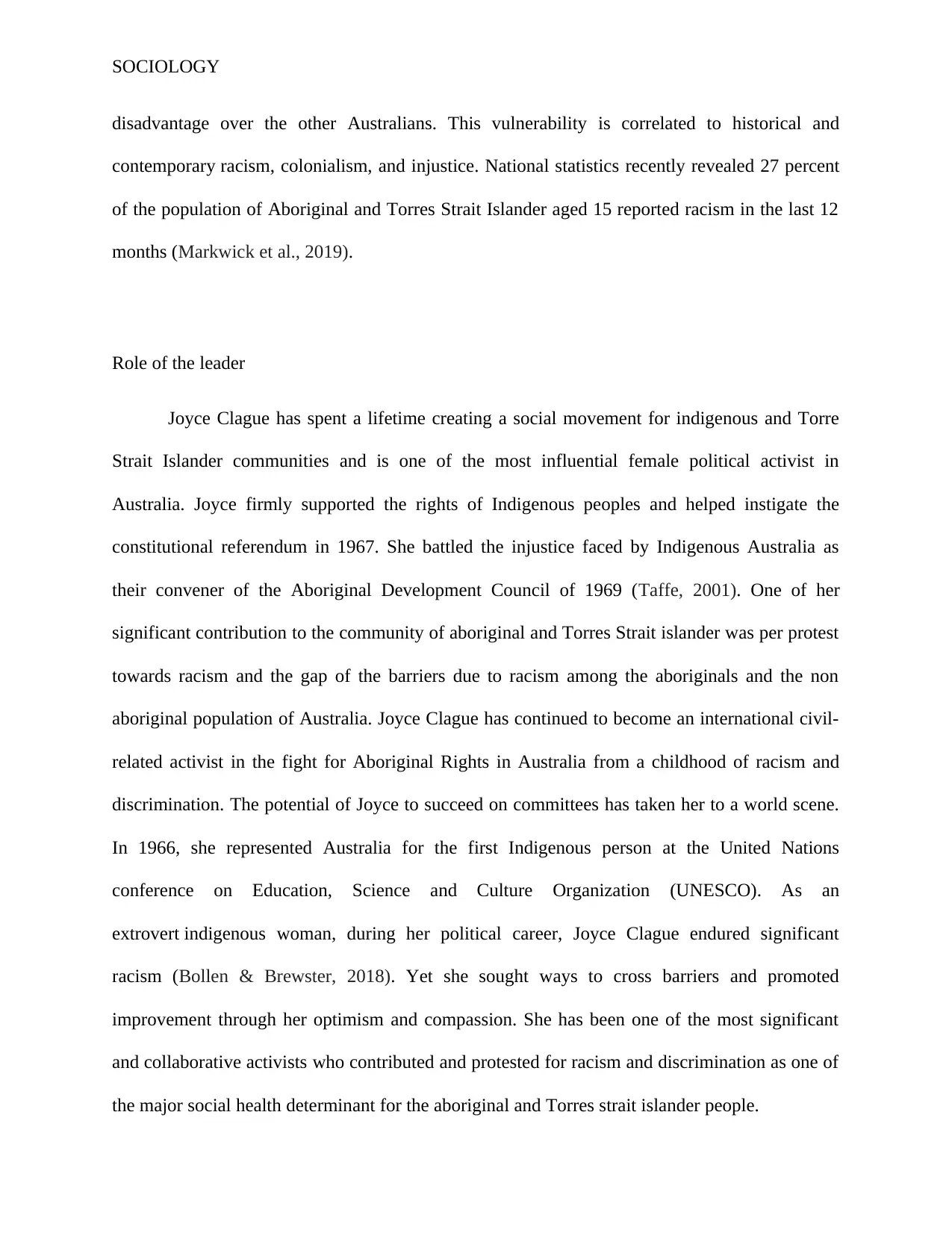
SOCIOLOGY
disadvantage over the other Australians. This vulnerability is correlated to historical and
contemporary racism, colonialism, and injustice. National statistics recently revealed 27 percent
of the population of Aboriginal and Torres Strait Islander aged 15 reported racism in the last 12
months (Markwick et al., 2019).
Role of the leader
Joyce Clague has spent a lifetime creating a social movement for indigenous and Torre
Strait Islander communities and is one of the most influential female political activist in
Australia. Joyce firmly supported the rights of Indigenous peoples and helped instigate the
constitutional referendum in 1967. She battled the injustice faced by Indigenous Australia as
their convener of the Aboriginal Development Council of 1969 (Taffe, 2001). One of her
significant contribution to the community of aboriginal and Torres Strait islander was per protest
towards racism and the gap of the barriers due to racism among the aboriginals and the non
aboriginal population of Australia. Joyce Clague has continued to become an international civil-
related activist in the fight for Aboriginal Rights in Australia from a childhood of racism and
discrimination. The potential of Joyce to succeed on committees has taken her to a world scene.
In 1966, she represented Australia for the first Indigenous person at the United Nations
conference on Education, Science and Culture Organization (UNESCO). As an
extrovert indigenous woman, during her political career, Joyce Clague endured significant
racism (Bollen & Brewster, 2018). Yet she sought ways to cross barriers and promoted
improvement through her optimism and compassion. She has been one of the most significant
and collaborative activists who contributed and protested for racism and discrimination as one of
the major social health determinant for the aboriginal and Torres strait islander people.
disadvantage over the other Australians. This vulnerability is correlated to historical and
contemporary racism, colonialism, and injustice. National statistics recently revealed 27 percent
of the population of Aboriginal and Torres Strait Islander aged 15 reported racism in the last 12
months (Markwick et al., 2019).
Role of the leader
Joyce Clague has spent a lifetime creating a social movement for indigenous and Torre
Strait Islander communities and is one of the most influential female political activist in
Australia. Joyce firmly supported the rights of Indigenous peoples and helped instigate the
constitutional referendum in 1967. She battled the injustice faced by Indigenous Australia as
their convener of the Aboriginal Development Council of 1969 (Taffe, 2001). One of her
significant contribution to the community of aboriginal and Torres Strait islander was per protest
towards racism and the gap of the barriers due to racism among the aboriginals and the non
aboriginal population of Australia. Joyce Clague has continued to become an international civil-
related activist in the fight for Aboriginal Rights in Australia from a childhood of racism and
discrimination. The potential of Joyce to succeed on committees has taken her to a world scene.
In 1966, she represented Australia for the first Indigenous person at the United Nations
conference on Education, Science and Culture Organization (UNESCO). As an
extrovert indigenous woman, during her political career, Joyce Clague endured significant
racism (Bollen & Brewster, 2018). Yet she sought ways to cross barriers and promoted
improvement through her optimism and compassion. She has been one of the most significant
and collaborative activists who contributed and protested for racism and discrimination as one of
the major social health determinant for the aboriginal and Torres strait islander people.
⊘ This is a preview!⊘
Do you want full access?
Subscribe today to unlock all pages.

Trusted by 1+ million students worldwide
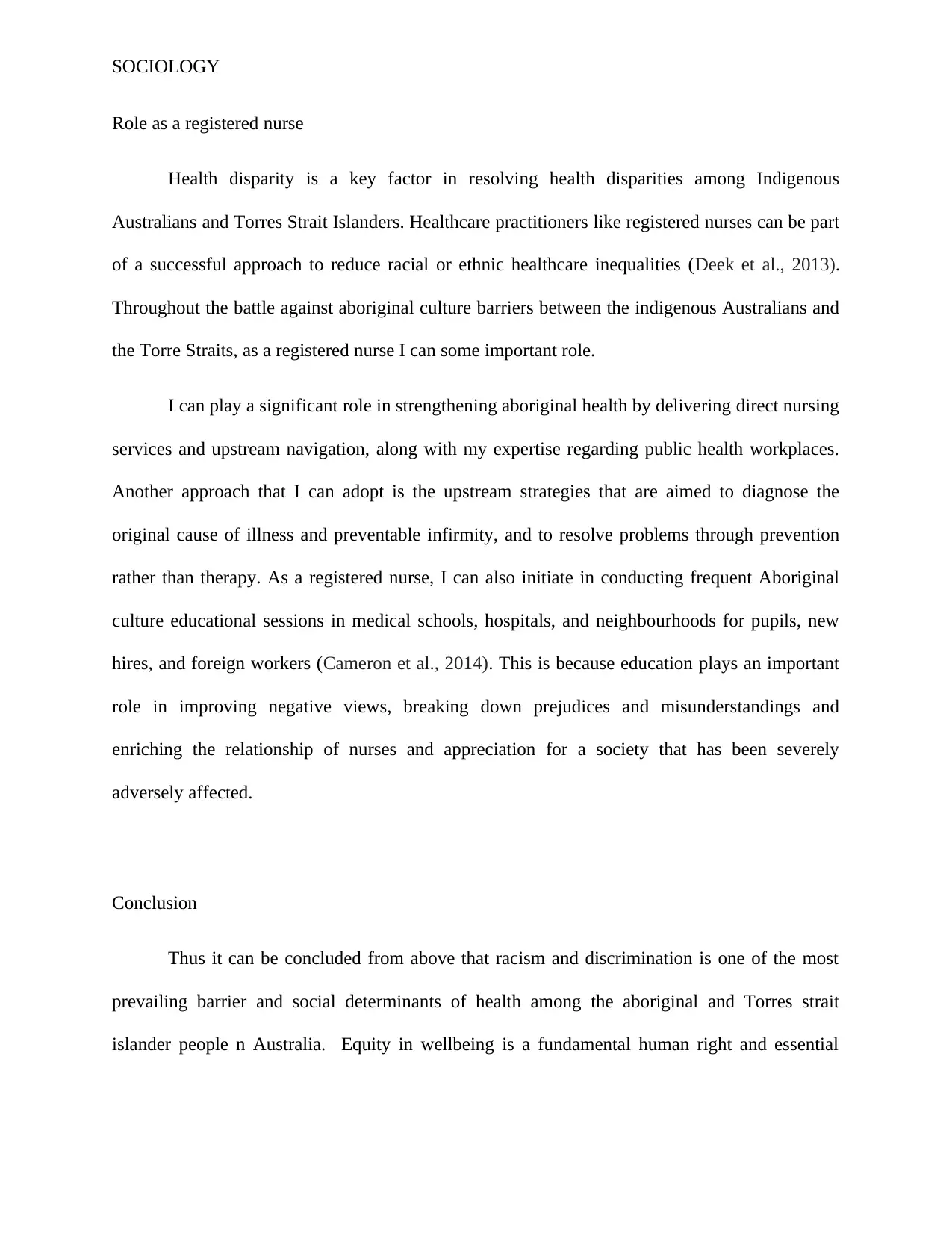
SOCIOLOGY
Role as a registered nurse
Health disparity is a key factor in resolving health disparities among Indigenous
Australians and Torres Strait Islanders. Healthcare practitioners like registered nurses can be part
of a successful approach to reduce racial or ethnic healthcare inequalities (Deek et al., 2013).
Throughout the battle against aboriginal culture barriers between the indigenous Australians and
the Torre Straits, as a registered nurse I can some important role.
I can play a significant role in strengthening aboriginal health by delivering direct nursing
services and upstream navigation, along with my expertise regarding public health workplaces.
Another approach that I can adopt is the upstream strategies that are aimed to diagnose the
original cause of illness and preventable infirmity, and to resolve problems through prevention
rather than therapy. As a registered nurse, I can also initiate in conducting frequent Aboriginal
culture educational sessions in medical schools, hospitals, and neighbourhoods for pupils, new
hires, and foreign workers (Cameron et al., 2014). This is because education plays an important
role in improving negative views, breaking down prejudices and misunderstandings and
enriching the relationship of nurses and appreciation for a society that has been severely
adversely affected.
Conclusion
Thus it can be concluded from above that racism and discrimination is one of the most
prevailing barrier and social determinants of health among the aboriginal and Torres strait
islander people n Australia. Equity in wellbeing is a fundamental human right and essential
Role as a registered nurse
Health disparity is a key factor in resolving health disparities among Indigenous
Australians and Torres Strait Islanders. Healthcare practitioners like registered nurses can be part
of a successful approach to reduce racial or ethnic healthcare inequalities (Deek et al., 2013).
Throughout the battle against aboriginal culture barriers between the indigenous Australians and
the Torre Straits, as a registered nurse I can some important role.
I can play a significant role in strengthening aboriginal health by delivering direct nursing
services and upstream navigation, along with my expertise regarding public health workplaces.
Another approach that I can adopt is the upstream strategies that are aimed to diagnose the
original cause of illness and preventable infirmity, and to resolve problems through prevention
rather than therapy. As a registered nurse, I can also initiate in conducting frequent Aboriginal
culture educational sessions in medical schools, hospitals, and neighbourhoods for pupils, new
hires, and foreign workers (Cameron et al., 2014). This is because education plays an important
role in improving negative views, breaking down prejudices and misunderstandings and
enriching the relationship of nurses and appreciation for a society that has been severely
adversely affected.
Conclusion
Thus it can be concluded from above that racism and discrimination is one of the most
prevailing barrier and social determinants of health among the aboriginal and Torres strait
islander people n Australia. Equity in wellbeing is a fundamental human right and essential
Paraphrase This Document
Need a fresh take? Get an instant paraphrase of this document with our AI Paraphraser
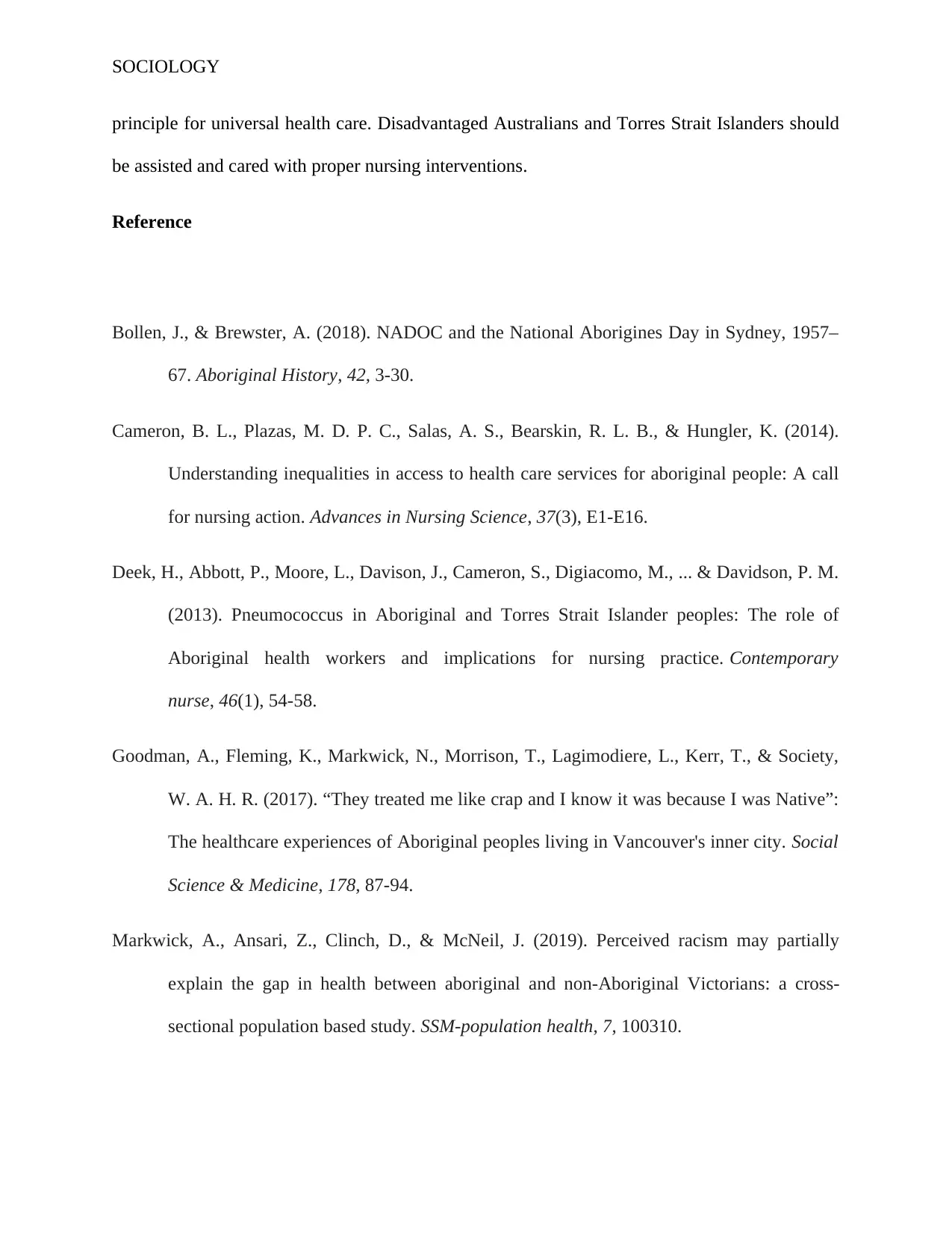
SOCIOLOGY
principle for universal health care. Disadvantaged Australians and Torres Strait Islanders should
be assisted and cared with proper nursing interventions.
Reference
Bollen, J., & Brewster, A. (2018). NADOC and the National Aborigines Day in Sydney, 1957–
67. Aboriginal History, 42, 3-30.
Cameron, B. L., Plazas, M. D. P. C., Salas, A. S., Bearskin, R. L. B., & Hungler, K. (2014).
Understanding inequalities in access to health care services for aboriginal people: A call
for nursing action. Advances in Nursing Science, 37(3), E1-E16.
Deek, H., Abbott, P., Moore, L., Davison, J., Cameron, S., Digiacomo, M., ... & Davidson, P. M.
(2013). Pneumococcus in Aboriginal and Torres Strait Islander peoples: The role of
Aboriginal health workers and implications for nursing practice. Contemporary
nurse, 46(1), 54-58.
Goodman, A., Fleming, K., Markwick, N., Morrison, T., Lagimodiere, L., Kerr, T., & Society,
W. A. H. R. (2017). “They treated me like crap and I know it was because I was Native”:
The healthcare experiences of Aboriginal peoples living in Vancouver's inner city. Social
Science & Medicine, 178, 87-94.
Markwick, A., Ansari, Z., Clinch, D., & McNeil, J. (2019). Perceived racism may partially
explain the gap in health between aboriginal and non-Aboriginal Victorians: a cross-
sectional population based study. SSM-population health, 7, 100310.
principle for universal health care. Disadvantaged Australians and Torres Strait Islanders should
be assisted and cared with proper nursing interventions.
Reference
Bollen, J., & Brewster, A. (2018). NADOC and the National Aborigines Day in Sydney, 1957–
67. Aboriginal History, 42, 3-30.
Cameron, B. L., Plazas, M. D. P. C., Salas, A. S., Bearskin, R. L. B., & Hungler, K. (2014).
Understanding inequalities in access to health care services for aboriginal people: A call
for nursing action. Advances in Nursing Science, 37(3), E1-E16.
Deek, H., Abbott, P., Moore, L., Davison, J., Cameron, S., Digiacomo, M., ... & Davidson, P. M.
(2013). Pneumococcus in Aboriginal and Torres Strait Islander peoples: The role of
Aboriginal health workers and implications for nursing practice. Contemporary
nurse, 46(1), 54-58.
Goodman, A., Fleming, K., Markwick, N., Morrison, T., Lagimodiere, L., Kerr, T., & Society,
W. A. H. R. (2017). “They treated me like crap and I know it was because I was Native”:
The healthcare experiences of Aboriginal peoples living in Vancouver's inner city. Social
Science & Medicine, 178, 87-94.
Markwick, A., Ansari, Z., Clinch, D., & McNeil, J. (2019). Perceived racism may partially
explain the gap in health between aboriginal and non-Aboriginal Victorians: a cross-
sectional population based study. SSM-population health, 7, 100310.
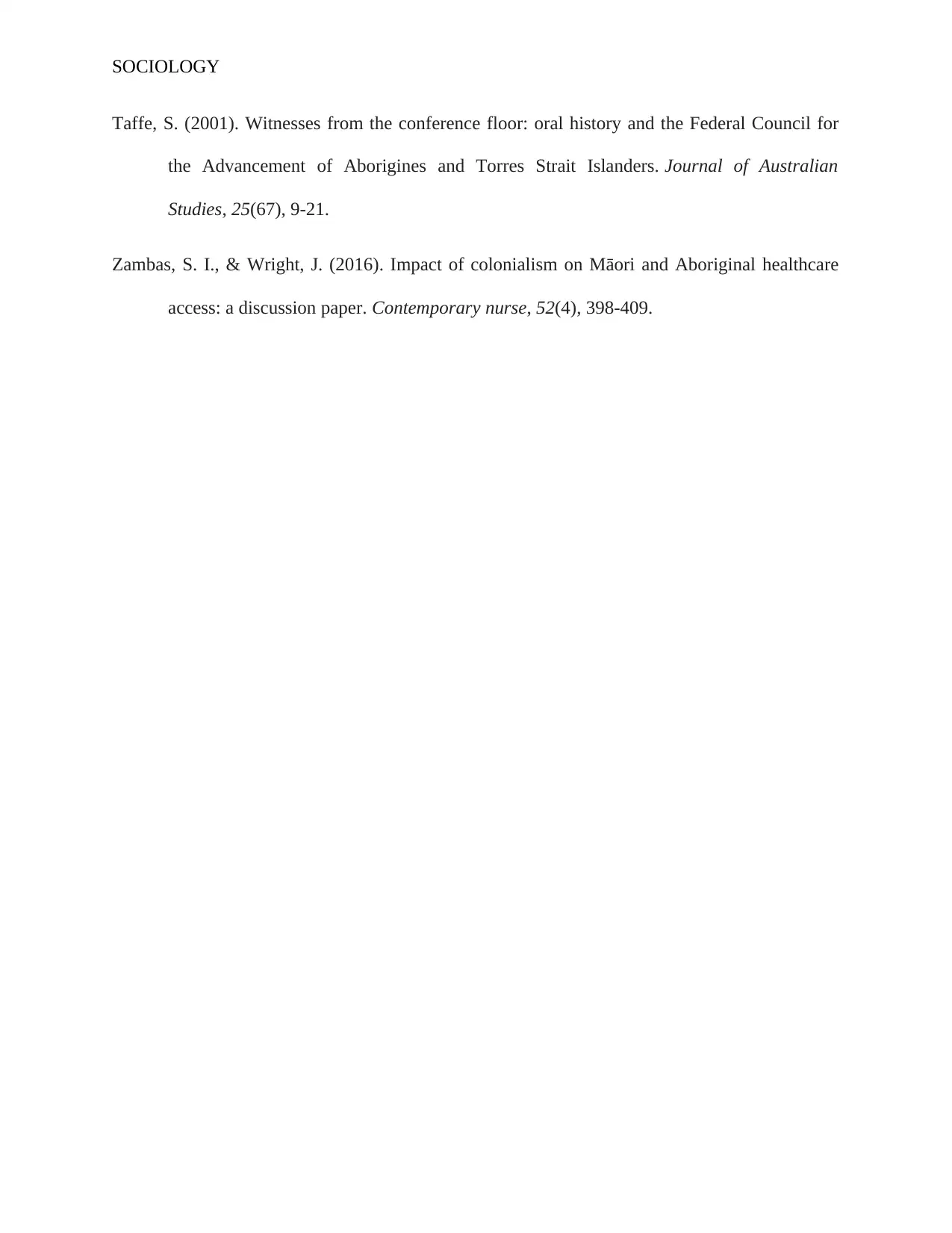
SOCIOLOGY
Taffe, S. (2001). Witnesses from the conference floor: oral history and the Federal Council for
the Advancement of Aborigines and Torres Strait Islanders. Journal of Australian
Studies, 25(67), 9-21.
Zambas, S. I., & Wright, J. (2016). Impact of colonialism on Māori and Aboriginal healthcare
access: a discussion paper. Contemporary nurse, 52(4), 398-409.
Taffe, S. (2001). Witnesses from the conference floor: oral history and the Federal Council for
the Advancement of Aborigines and Torres Strait Islanders. Journal of Australian
Studies, 25(67), 9-21.
Zambas, S. I., & Wright, J. (2016). Impact of colonialism on Māori and Aboriginal healthcare
access: a discussion paper. Contemporary nurse, 52(4), 398-409.
⊘ This is a preview!⊘
Do you want full access?
Subscribe today to unlock all pages.

Trusted by 1+ million students worldwide
1 out of 6
Related Documents
Your All-in-One AI-Powered Toolkit for Academic Success.
+13062052269
info@desklib.com
Available 24*7 on WhatsApp / Email
![[object Object]](/_next/static/media/star-bottom.7253800d.svg)
Unlock your academic potential
Copyright © 2020–2026 A2Z Services. All Rights Reserved. Developed and managed by ZUCOL.





